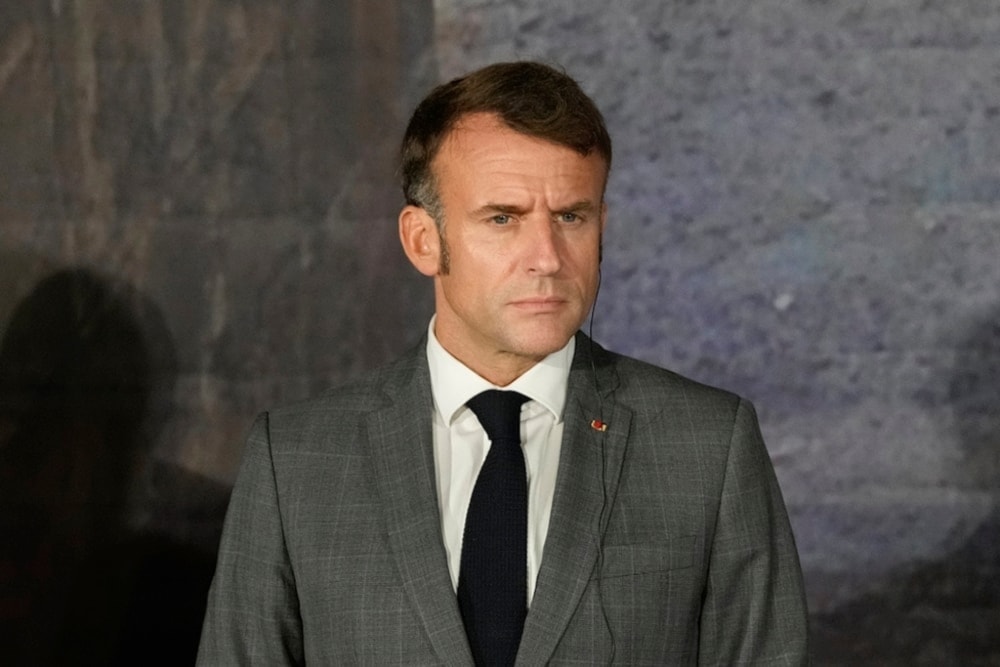Macron admits error on early elections in New Year’s speech
In a rare moment of self-reflection, French President Emmanuel Macron has publicly acknowledged the political fallout from his decision to call early parliamentary elections in June.
-

French President Emmanuel Macron during a Press conference in Cyprus on October 11, 2024. (AP)
French President Emmanuel Macron acknowledged on Tuesday that his decision to call for early parliamentary elections in June had led to greater political instability in France, marking an unusual moment of self-reflection.
In a televised address ahead of New Year's celebrations, Macron admitted, "Lucidity and humility force (me) to recognize that at this stage, this decision has produced more instability than peace, and I fully own up to that."
He further stated, "The dissolution caused more divisions in the Assembly than solutions for the French people," offering his most sincere apology since the elections.
Macron had initially called the early elections following a poor showing for his party in the European elections, believing it was necessary to "clarify" the political landscape. However, the move backfired, resulting in a hung parliament and a significant rise in far-right lawmakers, which weakened Macron’s power.
He lost his parliamentary majority and struggled for two months before appointing a minority government, which ultimately collapsed in December—the first such failure in France since 1962. As a consequence, France was unable to approve its 2025 budget by the end-of-year deadline, and Macron was forced to name his fourth prime minister in December, centrist veteran François Bayrou.
Looking ahead, Macron suggested that referendums might be used to address "decisive" issues, though he did not specify which ones. "I want us to act with 2050 in our sights. We will have choices to make, for our economy, our democracy, our security, our children," he said, referencing France’s long-term priorities.
The French president has the constitutional power to initiate referendums and has previously utilized "citizen conventions" to address domestic unrest, such as during the yellow vest protests.
On the international front, Macron called for the European Union to adopt a more assertive stance in global trade, warning against being "naive" as the bloc faces potential tariffs from US President-elect Donald Trump.
"We must say no to trade rules enacted by others and that we are the only ones to still comply with, say no to everything that makes us more dependent on others, without tradeoffs and without preparing the future," he declared.
Macron also touched on various global crises, including the ongoing wars in Ukraine and the Middle East, as well as election manipulation in Georgia, Romania, and Moldova. He stressed that Europe should no longer "delegate its security and defense to other powers," urging EU members who rely on the US protection to step up their own defense efforts.
Read next: Why Macron backed down on deploying troops to Ukraine: Analysis
US' absence could garner an additional European presence
The political landscape has also shifted, with the election of Donald Trump potentially affecting diplomatic dynamics.
A senior advisor to US President-elect Donald Trump, Bryan Lanza, has lately stated that the incoming administration will prioritize achieving peace in Ukraine rather than focusing on territorial restoration.
Speaking to the BBC World Service’s Weekend program in November, Lanza emphasized that the Trump administration would ask Ukrainian President Volodymyr Zelensky to present a "realistic vision for peace."
He added that if Zelensky insists that peace can only be achieved by reclaiming Crimea, it would demonstrate a lack of seriousness in negotiations, declaring, "Crimea is gone."
Trump has consistently stated that his priority is ending the war in Ukraine, and addressing what he sees as a drain of US resources through military aid, however, according to BBC's report, he has not yet revealed how he plans to achieve this.
While French President Macron remains a strong supporter of Ukraine, he and other European leaders fear their influence over future decisions may be limited. Their best hope now may be to help Ukraine gain any tactical advantage to strengthen its position in upcoming negotiations.
Former UK Prime Minister Boris Johnson warned that the country may need to send troops to Ukraine if newly reelected President Donald Trump scales back US financial or military support, reported Newsweek.
In a recent interview for GB News, Johnson explained that failing to back Ukraine could lead to higher costs for the UK and pose a threat to European security, suggesting that in such a scenario, it would be preferable for Britain to deploy troops to fill the gap left by reduced US aid.
It is also worth noting that UK Prime Minister Keir Starmer recently held talks with French President Emmanuel Macron to discuss strategies for preventing Donald Trump from reducing US support for Ukraine. The two leaders also sought to encourage President Biden to permit Ukraine to use Storm Shadow missiles against Russian targets.
Read next: Macron calls for European security autonomy from US

 5 Min Read
5 Min Read








